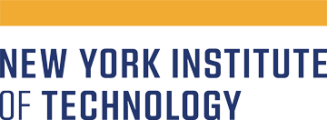The Online Master’s in Data Science
The world runs on data, and the leaders who understand its tools and techniques will win the race to the top. The Online Data Science, M.S. from New York Institute of Technology is made especially for those leaders—those who see data for what it is: an opportunity.
Push your expertise further in data science concepts and methods to reach the next level of your career. Armed with the latest skills and a degree from a top 15 university in the region, there’s no telling where you can go next.1
Program Details:
- 30 credits
- 100% online
- Complete in as few as 10 months*
- No GRE or tech prereqs required to start
- 3 opportunities to start per year
*Completion time may be as short as 10 months if previous education satisfies the prerequisites. Talk to an admissions outreach advisor to see if you are eligible.
Drive Your Career Forward
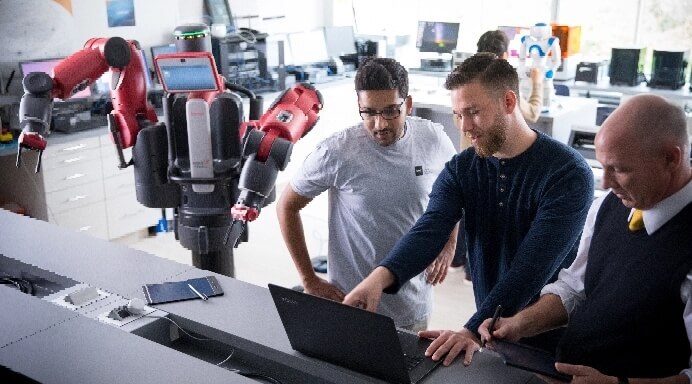
Put Yourself in Demand
Lead in one of the fastest-growing, well-paid positions today
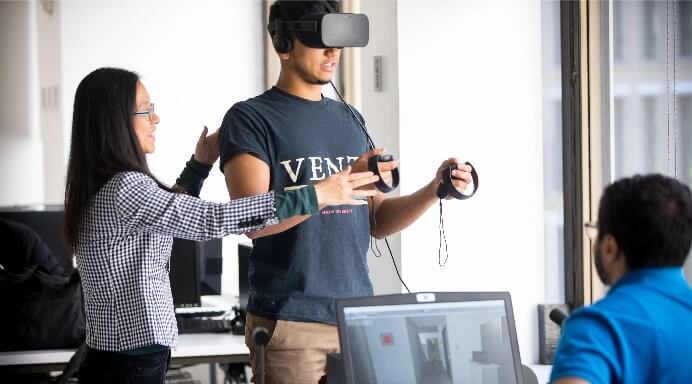
Make Your Learning Lucrative
Top 10% of U.S. Colleges for Return on Investment2
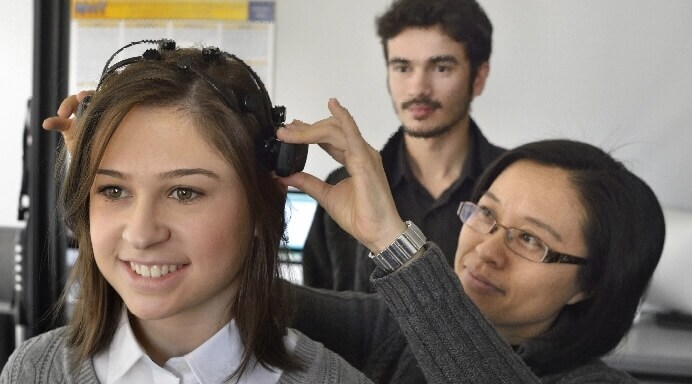
Explore Your Options
Apply your skills in healthcare, finance, biotech, and more
Master Emerging Tech
Considering a Master of Science (M.S.) in Data Science to take your career to the next level? Your journey starts here. Complete the form to get a program brochure for New York Tech’s College of Engineering and Computing Sciences online program.
Get valuable insights into the online experience, learn more about the College of Engineering and Computing Sciences, and see where this degree can take you.
This will only take a moment.
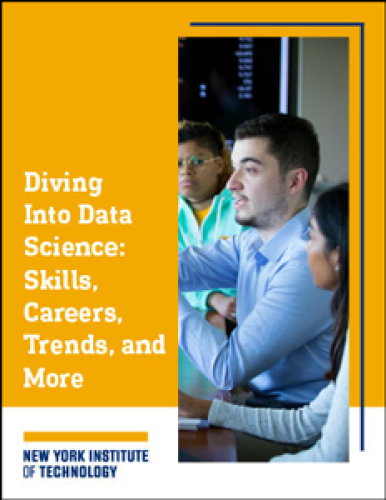
The E-book from New York Tech
Looking to pivot into data science or advance your career in tech? Get ahead with our free, comprehensive e-book that explores careers, essential skills, and more.
Download Now
Essential Data Skills for Dynamic Careers
It’s no secret that modern business is defined by data. At New York Tech, you’ll learn both the cutting-edge and practice-oriented aspects of data science to tackle any situation. When you commit to furthering your education in data science and its related fields, you’ll become highly valuable in the job market for years to come.
Program Takeaways:
- Computing theory
- Advanced data science
- Machine learning
- Data visualization
- Statistics
- Programming languages (SQL, R, SAS, Python, etc.)
Find Your Niche
At the end of the Online Master’s in Data Science program, you can choose to complete a thesis as part of your degree. Whichever subject matter you choose, the in-depth research and experience you complete will help you gain specialized skills and knowledge to better qualify you for research and development jobs. You also will have the chance to work on funded research projects with faculty members from sponsors such as the U.S. Department of Defense, National Science Foundation, and National Institutes of Health.
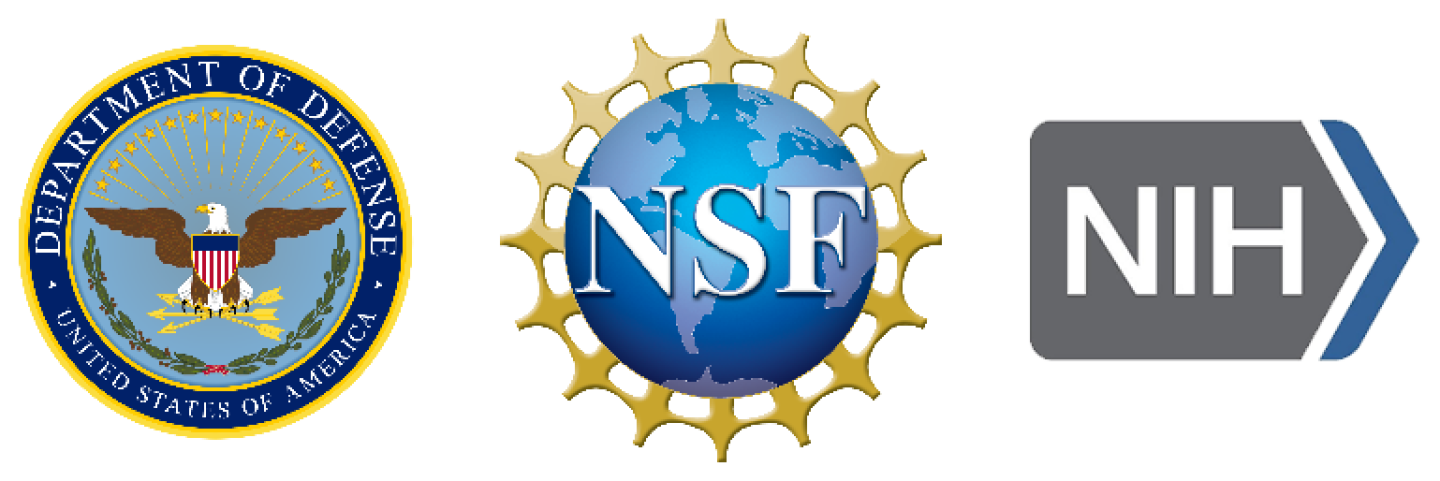

Course Spotlight
DTSC 710: Machine Learning
In this course, students will learn important machine learning (ML) and data mining concepts and algorithms. Emphasis is on basic ideas and intuitions behind ML methods and their applications in activity recognition, and anomaly detection. This course will cover core ML topics such as classification, clustering, feature selection, Bayesian networks, and feature extraction.
Online Master’s in Data Science Faculty
Faculty Spotlights



High Growth, Higher Rewards
The demand for data science professionals has exploded in the past decade. As more businesses invest in digital transformation, they’re collecting “oceans of data” that they aren’t equipped to handle but are desperate to capitalize on.5 That means that job opportunities for data scientists and analysts will continue to multiply, both in terms of numbers and compensation.
Employment of data scientists is projected to grow 35% from 2021 to 2031, much faster than the average for all occupations.4 With an average salary of about $120,000, a booming job market, and impressively high job satisfaction, ‘data scientist’ was ranked the third best job in America in 2022.3,6
What can I do with an Online Master’s in Data Science?

“With data, things that seemed impossible years ago can make life easier today in a very short time. With COVID-19, bipolar disorders, weather forecasts, and so many other uses, data science operations do the impossible.”
Sibel S.
Data Science, M.S. ‘22
Admissions At A Glance
Online Master’s in Data Science requirements:
- Completed application form
- A bachelor’s degree from an accredited institution, with a GPA of 2.85 or higher on a 4.0 scale*
- Copies of undergraduate transcripts
- Copy of college diploma or proof of degree
*If you do not satisfy this criterion, you may still be admitted at the dean's discretion. Talk to an admissions outreach advisor to explore your options.
Frequently Asked Questions
What is an Online Master’s in Data Science?
Download our Program Brochure for more information.
What’s the difference between data science and data analytics?
Data science is a broader field (that actually can encompass data analytics) which requires a knowledge of math, advanced statistics, predictive modeling, machine learning, and programming. It is multi-disciplinary and focuses on making connections, predicting outcomes, and uncovering new hypotheses within and between datasets. Those who earn a master’s in data science are poised to become successful as an applications architect, business intelligence developer, machine learning engineer, or statistician.
Data analytics, on the other hand, involves a closer, usually historical view of data to derive insights and inform business decisions. If you want to earn a master’s degree in data analytics, you should have a strong background in statistics, databases, and modeling. With these skills, you’ll excel as a senior data analyst, database administrator, or consultant.
Is a Master’s in Data Science worth it?
With this designation, as well as the valuable New York network and career resources that New York Tech provides, you’ll find that the Online Data Science, M.S. is well worth your time. So much so, in fact, that New York Tech is ranked No. 9 in New York and in the top 10% in the U.S. for Return on Investment (ROI)14, 2 As one of the top 25 universities in the region, we pride ourselves on putting our students and their needs first.1
Admissions Deadlines
Connect With Us
Stay Up To Date
Read the latest articles on data science topics, trends, and technologies.
Find Job Opportunities
Explore career options and average salaries in data science.
- Retrieved on March 4, 2024, from usnews.com/best-colleges/rankings/regional-universities-north?_sort=rank&_sortDirection=asc
- Retrieved on March 4, 2024, from cew.georgetown.edu/cew-reports/collegeroi/
- Retrieved on March 4, 2024, from glassdoor.com/List/Best-Jobs-in-America-LST_KQ0,20.htm
- Retrieved on March 4, 2024, from bls.gov/ooh/math/data-scientists.htm
- Retrieved on March 4, 2024, from fortune.com/education/business/articles/2022/01/19/how-much-do-grads-with-a-data-science-degree-make/
- Retrieved on March 4, 2024, from indeed.com/career/data-analyst/salaries
- Retrieved on March 4, 2024, from indeed.com/career/database-administrator/salaries
- Retrieved on March 4, 2024, from indeed.com/career/business-analyst/salaries
- Retrieved on March 4, 2024, from glassdoor.com/Salaries/cyber-security-engineer-salary-SRCH_KO0,23.htm
- Retrieved on March 4, 2024, from glassdoor.com/Salaries/it-director-salary-SRCH_KO0,11.htm
- Retrieved on March 4, 2024, from ziprecruiter.com/Salaries/SQL-Developer-Salary
- Retrieved on March 4, 2024, from indeed.com/career/machine-learning-engineer/salaries
- Retrieved on March 4, 2024, from glassdoor.com/Salaries/solutions-architect-salary-SRCH_KO0,19.htm
- Retrieved on March 4, 2023, from cew.georgetown.edu/cew-reports/lowincome/
